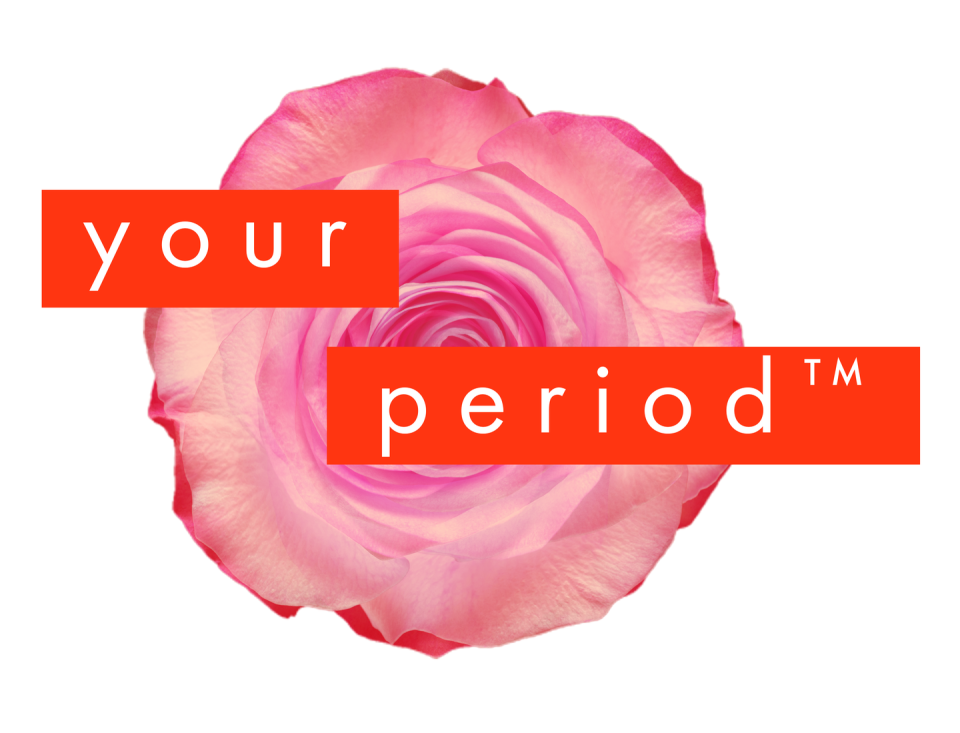Welcome to the Rebranding of Your Period™️

Hey, cutie. Just wanted to let you know that this story originally ran in our June issue, so if you like what you see, you should probably snag a hard copy ASAP. Bye!
According to my period tracker, week three of my cycle is when I’m hunkering down and exploring my inner emotions. It’s also when I should “keep an eye on the clock,” as I may lose track of time. Oh, and I might have a “physical and mental slowdown” thanks to rising progesterone levels (sounds about right, TBH).

The tracker was recommended to me by a friend in Denver who has used it to schedule her dating life and to keep things chill with her roommates. “I send them a Google Calendar invite so we know which days we will all be PMS’ing,” she explained.
Periods, you may have noticed, are suddenly cool. Shrouded in shame for centuries, they’re now trending as a Goop-y path to feminine empowerment and a mainstream cause célèbre. Viral campaigns like #HappyToBleed and #PeriodsAreNotAnInsult clap back at shamers and encourage women to get candid about their cycles on social. The Period Equity movement has helped prompt five states and D.C. to repeal sales tax on pads and tampons. The “red drop” emoji is hitting your smartphone this year thanks to an international girls’ rights group. Also: A documentary about periods just won an Oscar!
“There is a revolution going on in women’s period health,” confirms ob-gyn Leah Millheiser, MD, director of the female sexual medicine program at Stanford University.
Entrepreneurs, smelling blood (sorry), are feeding-and feeding off of-this menstrual frenzy. Tampons and pads used to be essentially our only options. Now, there are multiple kinds of absorbent period underwear, a ton of cute new menstrual cups, a menstrual disc you can wear for mess-free period sex, trackers that look like jewelry, period subscription boxes full of tampons and chocolate, and vaginal suppositories made with CBD to deliver medicine “directly to the area that needs it most.” A bakery in Washington even sends nutrient-rich desserts to your doorstep to satisfy those PMS pangs and “celebrate the magic that lives within your cycle.”
But amid the heavy flow (my apologies again) of products and services, it can be hard to distinguish true breakthroughs from savvy marketing. Innovative new ways not to ruin your jeans or take a sick day for cramps? Yaaas. But is a bitch massage to reduce premenstrual symptoms or a skin-care line for when you’re on your period really worth the cash?
The current period mania may be traceable to 2014, when Apple launched a health tracker and neglected to include menstruation. Its blind spot to the biology of half the population caused a public backlash-cue an explosion of new gadgets and products focused on women’s health. Femtech is now projected to be a $50 billion industry by 2025.
But science is still catching up with the rising red tide (Can’t. Stop.) of menstrual swag. “Most of these products are unregulated, and the claims they make are not necessarily based on robust research,” says ob-gyn Jen Gunter, MD, author of the forthcoming book The Vagina Bible. A lack of science is not ideal when you’re using an app to, say, not get pregnant. And the silence and secrecy that have historically surrounded menstruation have made us “low-information consumers who are vulnerable to the next shiny thing,” adds Chris Bobel, PhD, associate professor of women’s, gender, and sexuality studies at the University of Massachusetts at Boston and author of New Blood: Third-Wave Feminism and the Politics of Menstruation. “We’re so grateful for these new products and technology that we don’t approach them with enough scrutiny.”
For example: Period apps are now used by millions of women, but when researchers at the University of Washington surveyed 687 people and analyzed 2,000 reviews of popular period-tracking apps in 2016, they found that people with irregular periods reported “the apps were not good at predicting their cycles,” says study coauthor Julie Kientz, PhD, an associate professor of human-centered design and engineering.
Still, the new menstruati say that women’s health needs have been ignored by doctors for far too long (and they’ve definitely gotten far too few research dollars)-and that we’re finally getting the tools we need to hack our own cycle issues. “We’ve all been conditioned to think that the birth-control pill is a cure-all for any period problem,” says functional nutritionist Alisa Vitti, author of the best-selling book WomanCode. She says your period should actually be a boon and not a burden, helping you flourish at work, recharge your sex life, and feel happier and healthier. “We’ve been told that our periods are these mysterious, unpredictable, chaotic forces that we have to suffer and endure, but the scientific truth is that they are highly efficient marvels of nature,” says Vitti. “I have been standing on my soapbox for a long time saying, ‘We don’t have to suffer like this.’”
No one can deny that women paying more attention to their bodies is a good thing. “Menses really should be considered a vital sign, just like blood pressure, heart rate, and respiratory rate,” says Andrea Dunaif, MD, an endocrinologist at The Mount Sinai Hospital in New York City. Lisa Halvorson, MD, chief of the gynecological health and disease branch at the National Institute of Child Health and Human Development, says those research dollars may even be coming: The NICHD is providing early funding for companies that hope to use menstrual blood to screen for and diagnose health conditions.
But it’s worth noting that the current fixation on hacking your hormones isn’t applicable to anyone who takes hormonal birth control, which is a hell of a lot of women. And despite these products’ pro-woman veneer, I can’t help noticing that some of them still exploit female anxieties, using messaging that subtly reinforces the ideas that leaking is a huge embarrassment and that periods make all women moody bitches. “This line of thinking has been used to argue for why women shouldn’t be surgeons,” points out Shari Lusskin, MD, clinical professor of psychiatry, gynecology, and reproductive science at the Icahn School of Medicine at Mount Sinai. “God forbid we got our period. How could we be trusted to operate?”
Actually, a recent study found that hormonal fluctuations in the menstrual cycle had no meaningful effects on several types of cognitive function. And a review in Gender Medicine found that nearly 40 percent of menstrual-cycle studies showed zero link between your cycle and your bad moods.
“If you have a poor night’s sleep, that’s going to affect your day,” says Dr. Gunter. “If you overeat at lunch, it might affect your work presentation. It’s sexist to imply that our cognitive performance and mood changes are so dependent on our cycles.”
Dr. Lusskin, for her part, says the placebo effect is real and that it’s okay to use anything that makes you feel good. “The problem is when people use trackers for birth control-or spend huge amounts of money and time or forgo evidence-based medical care for treatments that aren’t backed up by research,” she says.
So yeah, I think I’ll skip the dried-plum diet my app is recommending. But the menstrual massage? Sign me up.
READ MORE
('You Might Also Like',)

